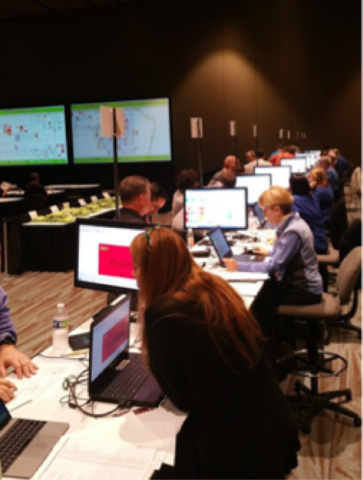EXPOCAD: Designing Show Floors Around the World for 30 Years

The original inspiration behind EXPOCAD® was to help engineers with computer-aided design (CAD) software. Paul Ososky, a plastics engineer, his brother Mike, a process engineer (now President and CTO), and Rich Stone, a synthetic fuels researcher (now CEO), started EXPOCAD’s parent company A.C.T., Inc. in 1986.
“Like any startup, life was not easy,” said Stone. “Frugal was an understatement. We started in a closet … it was only big enough for two people. If one had to leave the office, the other had to walk out into the
hall to let them out.”
A third Ososky brother, Peter, joined as a programmer and in 1988 designed the first automated booth drawing commands for the Society of Manufacturing Engineers (SME) and Freeman. Soon other engineering software customers signed on, including AMACO, Caterpillar, AT&T, NASA, McDonald’s, Motorola, John Deere, Ford and more.
Also that year, the company did their first trade show at Reed’s National Design and Engineering Show at McCormick Place in Chicago to build the brand and generate new business.
“We attended the onsite space assignment at NDES … watching the interaction of Freeman floor planners with their customers, and said, ‘there has to be a better way,’ “ Stone said.
The first product demonstration of the EXPOCAD software took place at the NAEM annual meeting (now IAEE’s Expo! Expo!).
“We told them that we had a new electronic floor plan sales and operations tool. We would do the presentation if they paid for the data projector,” Stone said. “It was expensive. It took three people all day to get the projector to work. We did the demonstration as an educational session to a
standing-room-only crowd using beta software that was barely functional. We left that session with a stack of business cards that couldn’t be held in one hand … the NAEM session was a validation of our efforts.”
That same year, SME did the first-ever onsite electronic space assignment
for AutoFact in Detroit. The first ad ran in EXPO Magazine in 1989,
spurring hundreds of phone calls in response to a quarter-page ad. Soon
EXPOCAD was working with virtually every large show organizer.
The company has moved four times since those days in the closet office, but all locations have been very close to each other. EXPOCAD’s home office for the past 20 years is in a 12,000-square-foot building in Aurora, Ill., which has experienced a bit of Hollywood fame.
During filming of the movie ‘The Express’ (about Ernie Davis, the first black player to earn the Heisman Trophy), the building’s first floor was transformed into a 1950s-era A&P Food Mart. Then again in the movie
‘Wayne’s World,’ there was a car chase up and down the street featuring a blue AMC Pacer with flames on the side.
Stone remembers how much technology pricing has dropped. “Years ago, 1 MB of memory cost $1,000. In today’s world, that would make an average cell phone about $1.6 million. A little pricey!”
EXPOCAD has enjoyed many major industry firsts over the years, including: graphical database, electronic floor plan tool for exhibitions, onsite space selection, online interactive floor plan, mobile platform
interactive searchable floor plan, onsite interactive kiosk, and variable pricing/yield management floor plan tool.
Today there’s a staff of 25 in the U.S., with five other offices in Dubai, Hong Kong, London, Shanghai, and Sydney. EXPOCAD technology powers 8,000 events annually, including almost every show floor plan in North America, as well as some of the largest shows on three other continents.


Add new comment